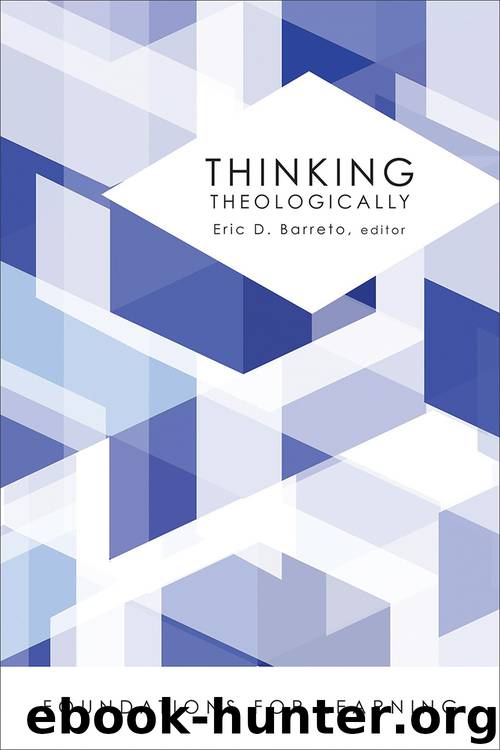Thinking Theologically by Eric D. Barreto

Author:Eric D. Barreto [Eric D. Barreto]
Language: eng
Format: epub
ISBN: 978-1-4514-9421-1
Publisher: Fortress Press
Published: 2014-01-01T05:00:00+00:00
Theological Creativity
We can spend a great deal of time thinking about our old wooden chest. We can admire the beauty of Nana’s story while poking our heads through the holes in the plot. We can track down the forest from which the original wood was hewn and wonder how many other trunks have come from those same trees. But in the end, the chest is meant to be used.
There are, of course, a host of options for how to employ this problematic heirloom. Some of us might decide to restore it to its original condition and hermetically seal it to prevent any erosion. But we may also take the chest, sand it down, refinish it, and repaint it, making it more suitable for our more colorful décor. We might use it to hold new things. We might one day discover that our kids have carved their initials into it. We might even break down the components of the chest in order to incorporate them into a new piece of furniture.
In the same way, we can move beyond thinking about Christian history and begin thinking with it. When we begin to reconcile the past as tradition with the past as problem, we can begin to engage our mothers and fathers in the faith as conversation partners in all their imperfect complexity. And our options look very similar to those we have with the old wooden chest. For example, we too can be tempted to restore and seal the tradition in its original condition, striving to keep the church just as it was in some putatively pristine past. But we may also reimagine the tradition in a new context, add our experiences to it, and even fix what we see as weak spots in its design.
Of course, to do all this responsibly, we have to be intimately familiar with what we have been given. We must know the path of the wood grain and the creak of every hinge. In taking time to learn about our Christian past, we must be open to the strange wisdom it has to offer. Only then can we faithfully and fruitfully adopt and adapt it in our own lives.
With this in mind, I want to suggest three general ways we can think with our history. First, we may see historical expressions of Christianity as resources for thinking about particular contemporary problems, be they theological, pastoral, or social. For instance, modern liturgical conversations have been enriched by engagement with ancient witnesses to early forms of worship, such as the second-century writings of Justin Martyr. The fruit of this engagement has included a richer understanding of the ways Baptism and Eucharist form and sustain communal identity.[2] The general assumption of such approaches is that we need not reinvent the Christian wheel. Many of our problems are not new, and though we likely do not want to appropriate the old answers wholesale, historical expressions of the issue can help us work through our own particular assumptions and concerns about a problem.
Download
This site does not store any files on its server. We only index and link to content provided by other sites. Please contact the content providers to delete copyright contents if any and email us, we'll remove relevant links or contents immediately.
Joan of Arc by Mary Gordon(4110)
Victory over the Darkness by Neil T. Anderson(2868)
The Gnostic Gospels by Pagels Elaine(2531)
Devil, The by Almond Philip C(2331)
The Nativity by Geza Vermes(2230)
The Psychedelic Gospels: The Secret History of Hallucinogens in Christianity by Jerry B. Brown(2157)
Going Clear: Scientology, Hollywood, and the Prison of Belief by Lawrence Wright(1985)
Going Clear by Lawrence Wright(1968)
A TIME TO KEEP SILENCE by Patrick Leigh Fermor(1912)
Barking to the Choir by Gregory Boyle(1821)
Old Testament History by John H. Sailhamer(1814)
Augustine: Conversions to Confessions by Robin Lane Fox(1772)
A History of the Franks by Gregory of Tours(1728)
A Prophet with Honor by William C. Martin(1725)
The Bible Doesn't Say That by Dr. Joel M. Hoffman(1680)
The Knights Templar by Sean Martin(1655)
by Christianity & Islam(1633)
The Source by James A. Michener(1613)
The Amish by Steven M. Nolt(1573)
